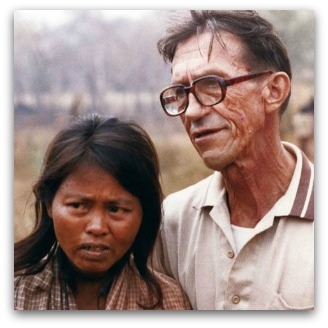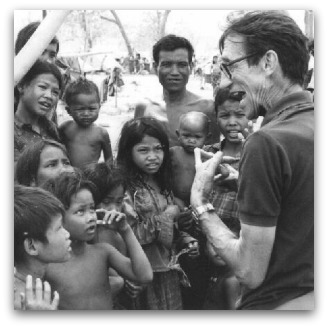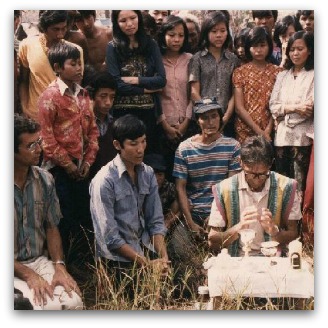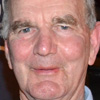eurekastreet.com.au
 Meetings
between holiness and politics are inherently dramatic. Think of Jesus'
trial, of A'Beckett's murder, of Luther at Worms, of Romero's last
sermon. Most of these were tragedies. In Fr Pierre Ceyrac, a French
Jesuit priest who died last week at the age of 98, politics and holiness met dramatically, but as comedy.
Meetings
between holiness and politics are inherently dramatic. Think of Jesus'
trial, of A'Beckett's murder, of Luther at Worms, of Romero's last
sermon. Most of these were tragedies. In Fr Pierre Ceyrac, a French
Jesuit priest who died last week at the age of 98, politics and holiness met dramatically, but as comedy.I met Pierre in the Cambodian refugee camps by the Thai Border. It was at the beginnings of the Jesuit Refugee Service. Pierre was then in his early 70s, having come from India where he had spent most of his Jesuit life, notably helping to form a national association of many thousand Catholic students.
He was a charismatic figure whose focus was entirely on the people whom he gathered together. He had an instinctive grasp of pastoral needs, but little interest in the institutional structures that might carry his work into the future. He lived for the day because the day is the place where people live.
Pierre was a recognisably holy man in the tradition of Francis of Assisi, whose gaiety, freedom and deep compassion he shared. He was totally present to the people with whom he was speaking and enjoyed their company. As a result those of us who knew him came quickly to treasure and to love him.
He also had a total freedom with money. He was comfortable begging for funds for his beloved refugees from leading people in French society and enjoyed their company. But he wanted nothing for himself. By my counting he had only a pair of sandals and a change of clothing, and never seemed to eat.
The Cambodian refugee camps were set in a complex and cynical political context. The United States and ASEAN nations supported them because they were associated with resistance groups, including the Khmer Rouge, which fought the Vietnamese occupation. The camps were supplied with food by the United Nations Border Relief Organisation (UNBRO) that also established the rules under which the many NGOs and volunteers worked.
The camp was set between the guns of the Thai army and the Vietnamese forces. It was guarded and gutted by members of the Thai paramilitary, many of whom were recruited from prisons.

Pierre was involved in simple community work, resourcing refugee groups that supported women and children at risk. Like other volunteers he had to find a way of working that expressed his idealism and faith and at the same time recognised the morally ambiguous context within which he was working. Nails given for building schools in the camp, for example, might be used to make mines that cost children their legs inside Cambodia.
These larger questions did not trouble Pierre. He was ruled by a single-minded love of the refugees whose faces he saw. They alone mattered. In serving them he was ready to disobey regulations whether made by the Thai authorities, UNBRO or NGOs. The challenge was to act in this way without being expelled from the camp.
Pierre managed to do this by being himself. He adopted a patently open hearted and friendly approach to people, including UN officials, Thai army colonels, the paramilitary and others who controlled the life of the refugees. His love was indiscriminating and his judgments of people kind to a fault.
Pierre's violations of rules were notable. The camp regulations allowed volunteers to bring into the camp only $5 each day. Pierre often brought in more than $1000, having cashed cheques from overseas relatives. The Thai authorities must have known what he was doing, but they knew, respected and liked him.
He was caught only once, and by mistake. The guards were told to look out for an old driver in Pierre's NGO who was bringing in large sums of money. The guards thought Pierre was the offender, and duly caught him red-handed. In fact, the target was a bus driver who was organising a lottery inside the camp. But having been caught, Pierre had to be sanctioned. The authorities sinbinned him for a month, and then allowed him to carry on as usual.
The United Nations security procedures for NGOs were also strict. If a shell landed in or near the camp, inevitable from time to time given the position of the camp, all NGO members had to evacuate the camp. Pierre scorned these provisions because they provided security only for expatriates, not for refugees. When there was danger he declined to leave the camp if he was there; he drove to the camp if he was away from it.

Like the Thai authorities, the UNBRO officials saw Pierre as an unguided missile, but also respected his integrity and allowed him space.
Young volunteers, in particular, had to reconcile their idealism with the ambiguous political reality of the camps. Pierre's pastoral presence and his celebration of Mass helped many find meaning and a way to live within ambiguity. The simplicity of his life and the depth of his accompaniment of people embodied the story of Christ that he recalled in the Eucharist.
He gathered up all the pain the volunteers encountered and experienced in the camps, all the joy they found in acts of accompaniment, and all the hope that life might come through them in this place and experience of death.
Pierre's resolution of the tension between holiness and politics was neither intentional nor a blueprint. It demanded a simplicity and transparency that were unique to Pierre. Some saw him as like the Holy Fool of Christian tradition. But this description does not do justice to his brilliant intuitive feel for pastoral strategy.
After he returned to Chennai in his 80s he hung out with the poor. One day a taxi driver approached him and asked him to help him educate his children. Pierre asked to meet them. So along came 12 children, all orphans, whom the driver was supporting.
Together they devised a scheme perfectly fitted to rural society. Pierre saw that widows needed income, young unmarried women were not free to work outside their homes, and orphans needed mentoring and tutoring. So they boarded the orphans with widows and employed the young women in the acceptable work of mentoring and tutoring the orphans. Pierre raised the money that blessed the lives of the widows and young women.
A simple and elegant solution. As simple and elegant as the humanity of Pierre himself.
 Andrew Hamilton is consulting editor of Eureka Street. Images courtesy Jesuit Refugee Service.
Andrew Hamilton is consulting editor of Eureka Street. Images courtesy Jesuit Refugee Service.
3 comments:
God bless father Pierce and
God has good place for him by his side.
The holiness, I came to know him in Site II refugee Camp
May God bless Father Pierre Ceyrac and be with him forever.
I've seen him in a TV documentary about Khmer refugees in Site II. He was so caring like a godsend and a saint. May his soul rest in peace.
Post a Comment